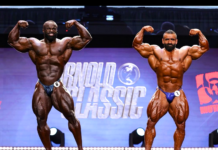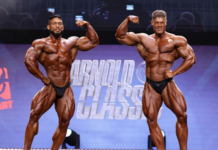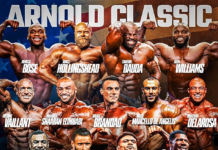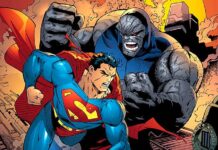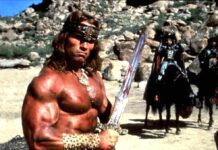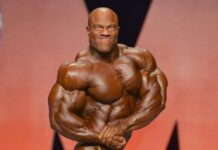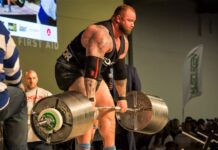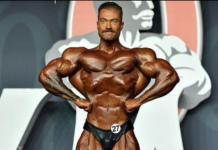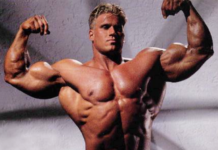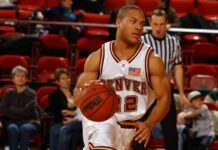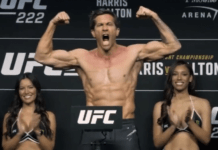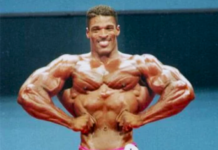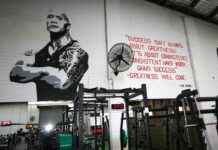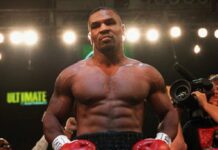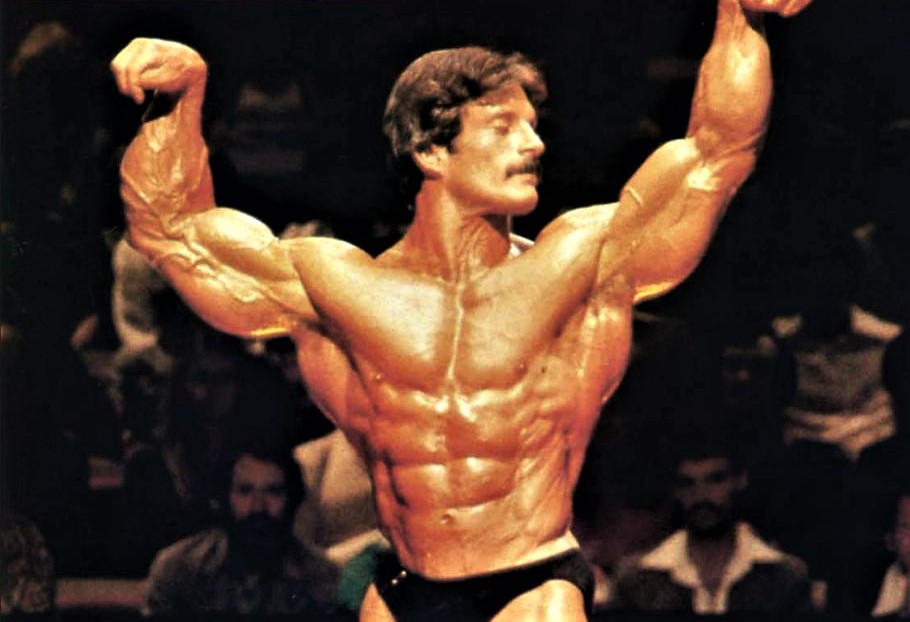Mike Mentzer passed away on June 10, 2001. He was 49. Peter McGough, the giant of bodybuilding journalism who passed away December 29, 2020, at 71 wrote the definitive profile of the enigmatic Mentzer. (Peter’s life story is here.) To get him to open up about his darkest days, Peter did multiple interviews with Mike, and he spent more time laboring over the following article than any other he ever wrote. He felt it was best work. It originally appeared in the February 1995 issue of FLEX under the title “Whom The Gods Bless, They Eventually Restore!” It was reprinted in FLEX after Mentzer’s death with the title seen here and with a preface by McGough, then editor-in-chief of FLEX. (Our photos are different than either of those printings.)
In that preface, Peter explains that Arnold Schwarzenegger subsequently called Mentzer, and the two buried their differences, so readers should keep that in mind when reading Mentzer’s caustic comments about the 1980 Mr. Olympia. Peter McGough concluded his 2001 preface with this: “Mike Mentzer was a complex and gifted man who leaves an indelible mark on the bodybuilding landscape. We offer the following story as a means of paying tribute to the passing of a forceful and enigmatic individual who has surely attained the status of bodybuilding icon.”
PROLOGUE: THE END
Sitting alone in the psychiatric ward he had been confined to for four weeks, he stared at the clinically scrubbed walls. It was the last day of January 1990, and he knew that nearly five years of trauma, despair, pain and grieving were about to be brought to a shattering resolution. During those five years, he had been institutionalized several times, been arrested, indulged in bizarre behavior and been written off as “a crazy” by the vast majority of those who were once peers, friends and associates.
But on that fateful day, he was aware that something cataclysmic was about to happen. The seed had taken root a few weeks previously, and over the past three days it had grown with a mushrooming greenhouse effect. For nearly five years, his psyche had wrestled with demons who made the rules of the cruel mind games they subjected him to. Now, in one piercing insight, he was to be released from his private hell. It was all so simple and obvious. In a clear, triumphant tone, his unconscious urged: “Go back to what you know, Mike Mentzer!”
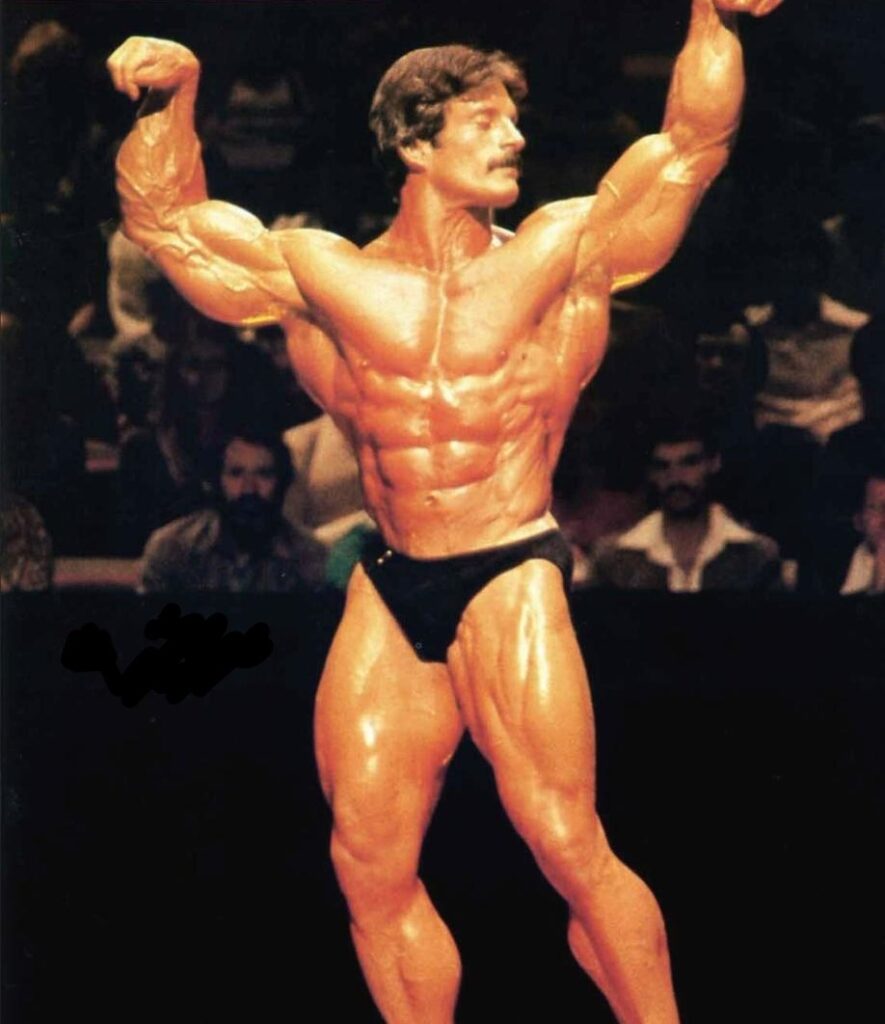
What Mike Mentzer knew was bodybuilding. And it had all started more than 27 years earlier.
THE FIRST IMAGE
“It was late 1962. I was 11 years old and was with my mother at a local drugstore in my hometown of Ephrata, Pennsylvania. Scanning the vast array of publications on the newsstand, my attention suddenly became arrested by the sight of a bodybuilder on a magazine cover. The bodybuilder was Bill Pearl, who eventually became my idol.
“There was an immediate emotional recognition—I knew that this was what I wanted to do. I asked my mother to buy the magazine, then ran home with it to read every single word. That evening, I asked my dad to buy me a set of weights, but he answered, ‘Not until Christmas.’ I didn’t have long to wait, and how I remember that gleeful Christmas morning when I found the weights under the tree. I spent the whole holiday down in the basement lifting weights.
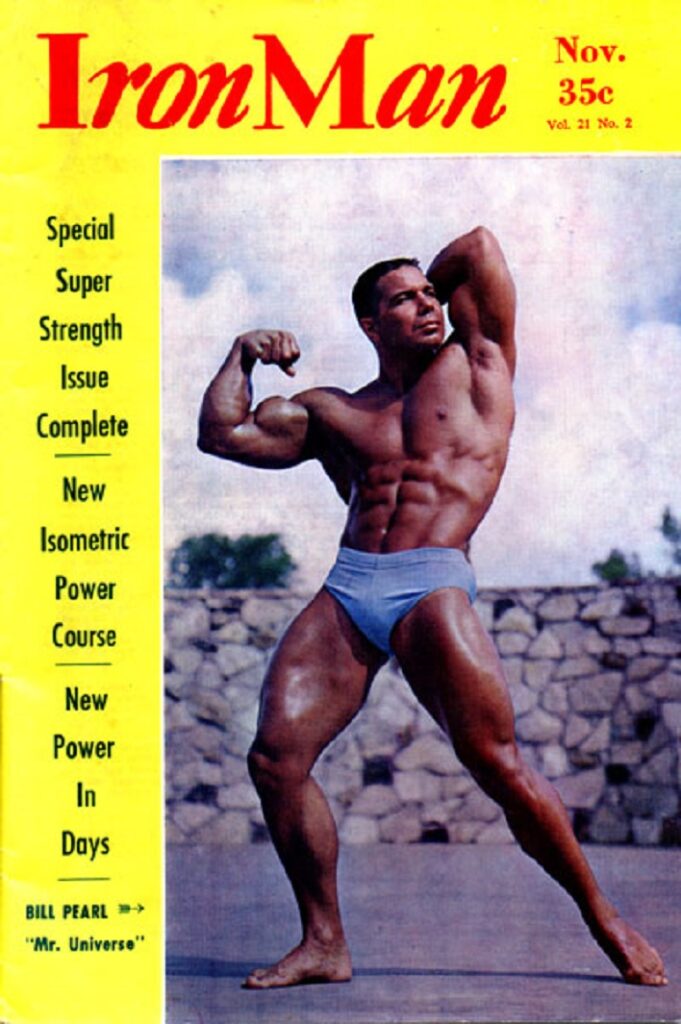
“I trained by myself for a year, and then my father—impressed by my commitment—contacted an old buddy of his who worked out. His name was John Myers. He was about 40 at that time and had a superbly equipped gym in his garage. John invited me to train with him and his workout partner, Russell Hertzog, times a week. Russell was in his late 20s and was an Olympic lifter, while John was a powerlifter. I worked with them on Olympic and power movements, and they always encouraged me to train heavy. They had a massive influence on my early training. Thereafter, I’ve always considered myself as not just a bodybuilder but a strength athlete also.”
IN THE PRESENCE OF THE CHAMP
“When the show ended, I went out into the alley, clambered over a barrier, scurried up a fire escape and walked into this large room where, lo and behold, there stood Larry Scott and Dave Draper. I just gawked at them and will never forget the image of Larry wiping the oil off his enormous arms. Larry was quite friendly, and he, Dave and I shared an elevator as we left the building. Outside, as soon as the crowd saw Larry, they went even crazier than they had in the afternoon. I thought about how exhilarating it must be to be the center of all that excitement to actually have fans waiting for you!
“In 1965, John was kind enough to take me to New York to see Larry Scott win the first-ever Mr. Olympia contest. That whole day had an enormous impact on me—I can recall it as if it were yesterday. I stood outside the Brooklyn Academy of Music amid the bustling throng, and when Larry Scott arrived, the people literally went crazy.”
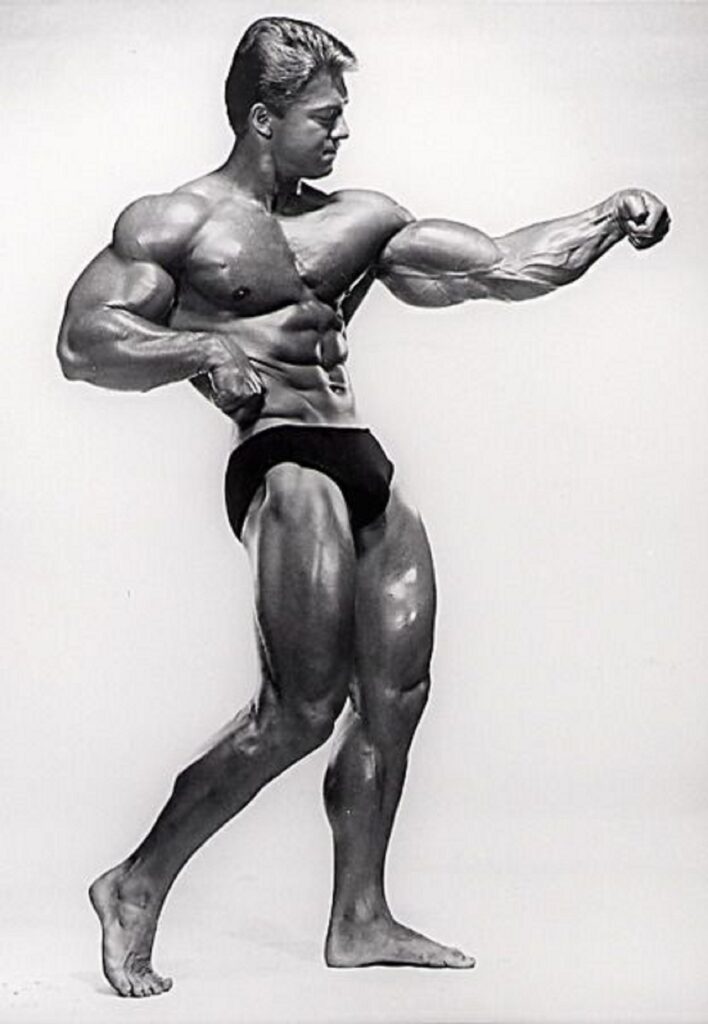
“The 1965 Mr. Olympia contest was almost a religious experience for me. I returned home, sat down with the latest Muscle Builder/Power [forerunner to Muscle & Fitness] and scrawled on the inside cover the following inscription:
Mike Mentzer – Mr. America 1972
Mike Mentzer – Mr. Universe 1974
Mike Mentzer – Mr. Olympia 1976
I wasn’t yet 14 years old, but I had no doubt that by the time I was in my mid-20s, I could be the best bodybuilder in the world.”
FAMILY VALUES
The teenager who had committed his ambitions so boldly to paper was the product of a family of German origin. He had an older brother and sister, and a younger brother, Ray, who would follow in Mike’s training shoes. His childhood was a fairly solid upbringing. “We were taught the difference between right and wrong,” Mike says simply.
Mike dearly loved and respected his father, and he describes the influence the elder Mentzer had on him as a boy: “My father, although not an intellectual, learned something about the value of knowledge in the course of his life and sought to inculcate that value in me. He would reward me whenever I did well in school. On one occasion, he gave me a $20 bill for doing well; another time he gave me a baseball mitt. He was keen to encourage my studies and would brag about his smart son to his friends.
“He was a tough-minded individualist who always seemed to find it easy to stand up for what he believed in. In fact, at times, he reveled in that role, even boasting about his strength of integrity, which had a habit of irritating others of a weak-willed ilk. Dad was not averse to a fight. Ray and I responded greatly to our father’s sense of self-esteem, which resulted in our becoming strong individuals. I can remember people referring to ‘The Mentzers’—the inference being that we were arrogant and conceited. This only served to fuel my innate individualism. In fact, we were not arrogant, we were just proud of ourselves. Dad and I were very close—he died in 1985.”
LEARNING THE ROPES
At 18, Mike entered his first bodybuilding contest—Pennsylvania’s 1969 Mr. Lancaster County—and won. A year later, he won the Mr. Pennsylvania contest. In June 1970, he enlisted in the Air Force and was stationed at Andrews Air Force Base in Washington, D.C.
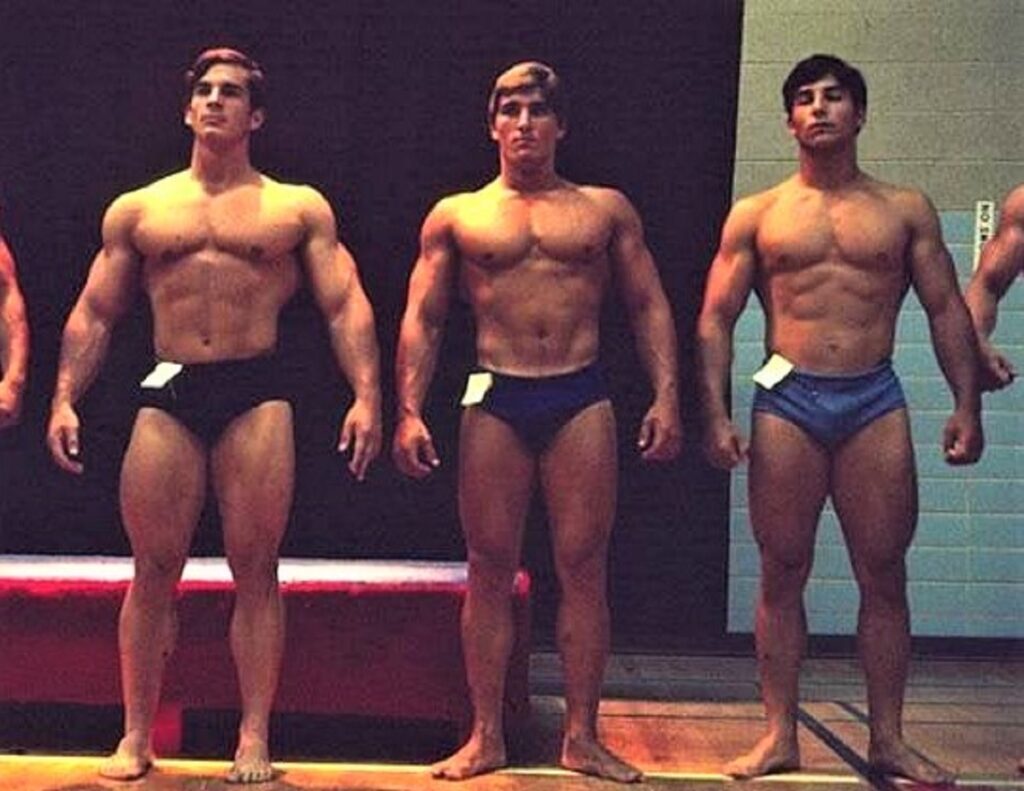
At age 19, Mike entered the 1971 Mr. America contest, but another 19-year-old was destined to take all the glory and make history by becoming the event’s youngest-ever winner. A sensational Casey Viator scooped up the 1971 Mr. America title and all the best-bodypart categories. Mike finished 10th overall, but had the consolation of being second to Viator in the “best legs” and “best arms” categories. Casey was a student of the Arthur Jones theory of high intensity training—the Nautilus system—which had been launched in 1969. The 1971 Mr. America obviously saw something in his contemporary, because afterwards, Casey approached Mike, telling him he had “great genetics.” He further gave Arthur Jones’ phone number to Mike and urged the youngster to phone the eccentric inventor.
THE WAKE-UP CALL
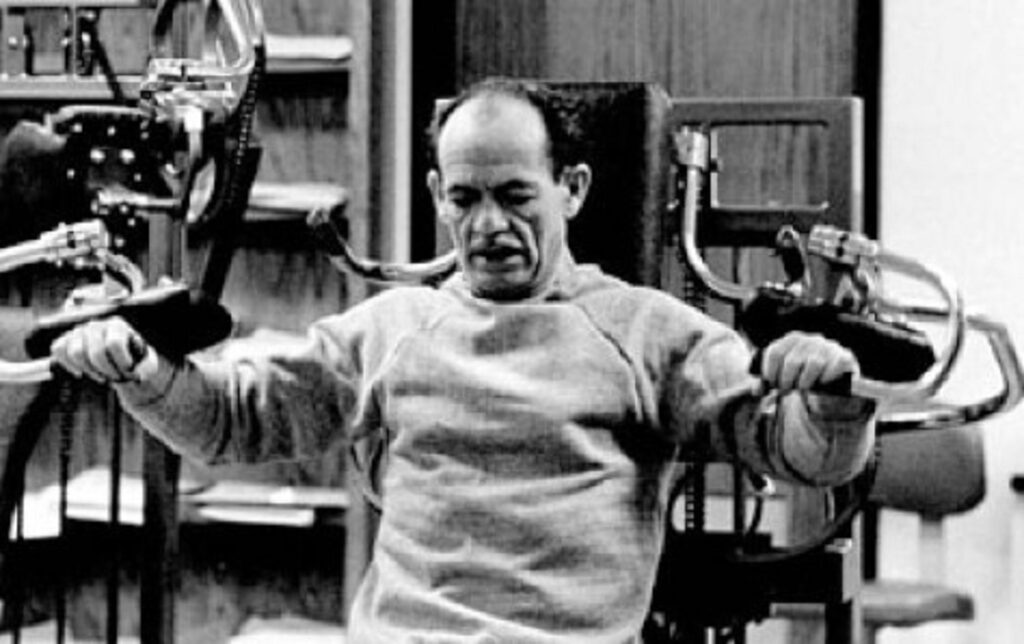
“I called Arthur some days later, but he wasn’t in, so I left a message. The next night at three in the morning, the phone rang. It was Arthur Jones—which shocked me. I was to learn later that such behavior was normal for Arthur. It wasn’t really a conversation, it was a lecture, during which he explained to me in the most precise, scrupulously objective language possible the actual science of productive bodybuilding exercise. He detailed why such exercise, in light of the body’s limited recovery ability, had to be brief and infrequent. During that lecture, I discovered I was not the training virtuoso I thought I was. What amounted to mindlessly thumbing through muscle magazines and memorizing training routines didn’t make one an expert. I realized I knew little about the science of exercise, while this man knew a whole lot! It was, literally, a wake-up call.
“Jones wrought a fundamental change in how I thought about training, but an even greater influence was the one he had on my thinking processes. While my parents and teachers had paid, what amounted to, in retrospect, only superficial lip service to the values of thought, logic and reason, Arthur Jones was absolutely passionate about those values. That impressed me very, very much.”
A CAREER ON HOLD
According to Mike’s Muscle Builder/Power inscription, 1972 had been the year that he had predicted he would win the Mr. America title. But circumstances combined to keep him off the bodybuilding stage for several years. Shortly after the ’71 Mr. America, Mike severely injured his right shoulder and couldn’t even train for eight months. His Air Force duties had also become more time consuming: He was working enervating 12-hour shifts while moonlighting on the side. He had also met and fallen in love with Cathy Gelfo. It was a relationship that was to last for over a decade. The 1972 Mr. America contest therefore came and went without the participation of Mike Mentzer. He fell out of shape, and even when the injury cleared up, it seemed he might never compete again.
By 1974, Mentzer was becoming a little depressed about his inactivity, but gradually his training appetite returned. He kick-started his enthusiasm by challenging himself: “Do you want to reach the age of 50 and be forced to look back and say, “Gee! I could’ve been the best bodybuilder in the world, but I didn’t even try?” In April of that year, Mike left the Air Force and enrolled at the University of Maryland on a three year program in which he studied biology, chemistry and mathematics. His goal was to eventually enter medical school and train to be a psychiatrist. He also returned to the gym, and in late 1974 entered the Junior Mr. America, where his 190 muscular pounds on his 5’8″ frame took first place.
The 1975 Mr. America was being staged in Los Angeles by Franco Columbu, and Mike arrived at the contest a hard and cut 195 pounds, fully confident he would win. That confidence, however, was dissipated in one swift stroke. “As soon as I saw Robby Robinson strip off backstage, I realized I wasn’t going to win,” he states. Mike finished third behind Robby and Roger Callard, but the 1975 Mr. America extravaganza represented a pivotal moment in his career and life because he met Joe Weider at that contest. The Master Blaster whisked the 23-year old away for a photo-and-interview session, and Mike ended up on a front cover of Muscle Builder/Power.
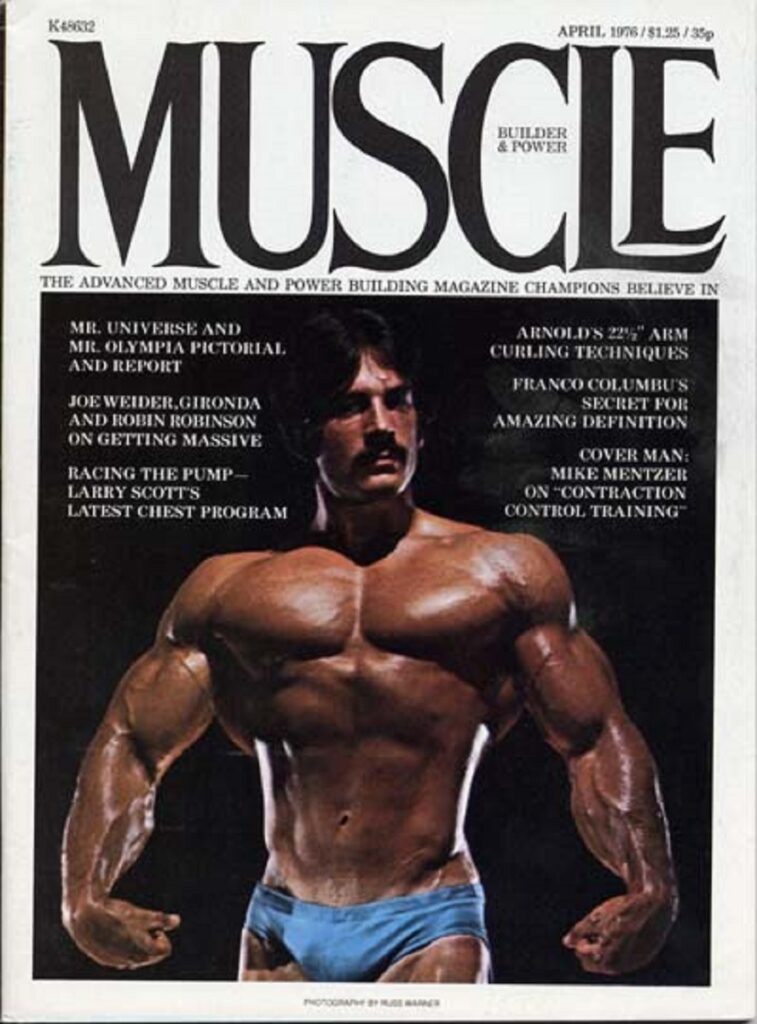
But of greater significance was the series of training articles Mike penned for the magazine. The principles he expounded training three times a week and doing only three to five sets a bodypart—caused a minor sensation among bodybuilders. Joe Weider invited Mike to come out to California to work for him at Muscle Builder/Power. But with his college studies being paramount, Mike declined the offer.
A year later, Mike was crowned the 1976 Mr. America. He was four years behind the schedule he had mapped out in 1965, but as a bodybuilding personality and training guru, Mike Mentzer had definitely arrived.
CALIFORNIA, HERE I COME
“It was a freezing-cold day in February 1977, and trudging the half-mile across the University of Maryland campus to my next class, I ruminated on my lifestyle. Finances were a problem, and I was moonlighting to earn extra money. Even then, I didn’t have a lot to spend on Cathy and wasn’t seeing her as often as I wanted to; I was crazy about her. I was studying up to 12 hours a day, while also working out.
“I was tired of being broke and was growing disillusioned about becoming a psychiatrist. I realized that Sigmund Freud, R.D. Laing [late British psychiatrist]—a guy who romanticized schizophrenia—and all the others were on the wrong track. Their principles rarely helped anybody. People who were psychotic, or neurotic, seldom recovered unless what they were suffering from was an episode of acute psychosis, which sometimes resolves itself. I was fast giving up the idea of becoming a psychiatrist, but my fascination with the mind was drawing me toward the study of philosophy.
“By chance, I’d just read a profile of Joe Weider in Sports Illustrated in which he talked about his interest in philosophy. On impulse, I called Joe and asked him if the invitation to go to California was still open. He said it was, and I made arrangements to move out there in the summer. My idea was that I’d go to California, become a pro bodybuilder and make a lot of money before returning east after two or three years to start another university course. I arrived in L.A. with that plan on June 7, 1977. I’ve been here ever since.”
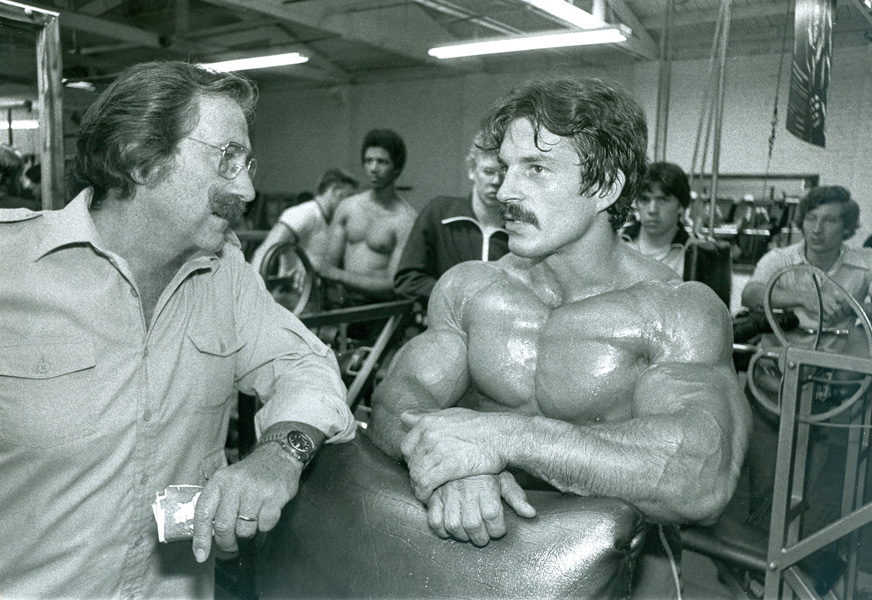
THE ROAD TO THE PROS
Mike landed in Los Angeles by way of Vancouver, where he had won the Mr. North America contest the previous weekend. At Muscle Builder/Power, he was appointed associate editor, and within a couple of months had launched his mail-order courses. Marketed under the Heavy Duty banner, they sold in phenomenal numbers. Although sidetracked by his relocation and expanding business interests, Mike still entered the 1977 Mr. Universe contest in Nimes, France, where he finished second in the heavyweight class to Kal Szkalak.
Feeling he had not done himself justice in France, Mike threw himself into an all-out assault on the 1978 Mr. Universe staged in Acupulco, Mexico. At 215 pounds, he took the title with the first perfect score recorded in IFBB history. According to his 1965 Muscle Builder inscription, he was still four years behind his title-winning schedule. But he was now a professional, and the pose-for-pay scene was just about to enter a new and more lucrative era.
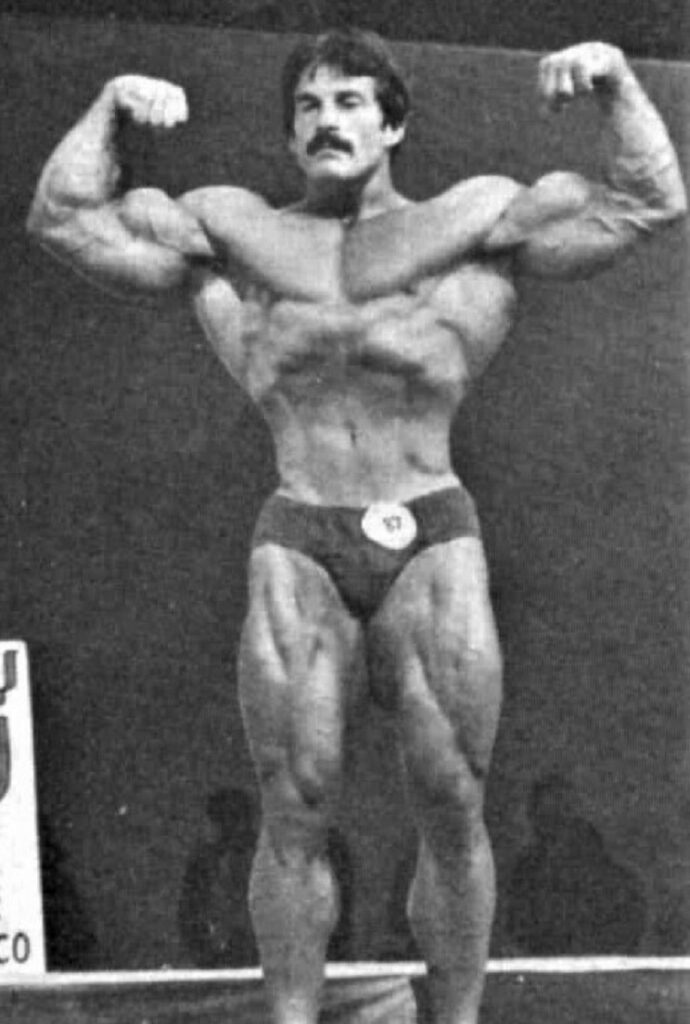
In February 1979, three months after his Universe win, Mike made a victorious start to his pro career by winning the Southern Professional Cup in Florida. Several weeks later, he finished second to Robby Robinson at the Pittsburgh Pro Invitational, and followed that up with a third spot behind Robby and Danny Padilla at New York’s Night Of Champions. But by the early summer of 1979, bodybuilding wasn’t the subject uppermost in Mike’s mind.
“My mother was terminally ill, and my motivation was flagging,” he recalls. “The night before the Night Of Champions, I received some very bad news concerning her condition, and two weeks later, she died. I was devastated. With my newfound financial success, I was planning on bringing her out to California and arranging for her to vacation in Europe. Now, I would never be able to do those things for her. I stopped training for six weeks, ate all the wrong things and put on too much weight to a point where I barely looked like a bodybuilder.
“The 1979 Mr. Olympia was in October, and by the end of June, I knew I’d have to pull myself together or forget about making my Mr. Olympia debut. I whipped myself into a tenacious lather, but three weeks prior to the contest, Ray checked me out and said, ‘Gee, Mike, you’re not gonna make it. Look, we’ve had a rough year, our mother died—everybody will understand if you don’t compete.
“Rather than deflating me, Ray’s words gave me more incentive to push ahead. I went forward with the thought that whatever the punishment I submitted myself to, it would be all over in three weeks. In those last three weeks, I improved 300%. On the day of my first Olympia, my spirits were very high. I thought I could beat Frank Zane. I figured my proportions were equal to his and, at 220 pounds, I was so much bigger.” Mike won the over-200 pound class [until 1980, the Mr. Olympia comprised two classes: over and under 200 pounds], but lost out to Zane—the under-200-pound winner—in the faceoff for the overall Mr. Olympia title.
THE BODYBUILDER FOR THE ’80S?
By the late 1970s, Mike Mentzer had fashioned a physique that broke new ground in muscle density and ruggedness. His was not a pretty-boy physique; the rock-hard musculature displayed symmetrically throughout his frame really did give the impression of unlimited power. A 1979 cover for Muscle Builder/Power that portrayed Mike as the reincarnation of Hercules precisely captured his bodybuilding persona.
The same magazine served as the ultimate showcase for Mike’s unique bodybuilding methods. (In truth, save for Rick Wayne, there has never been a bodybuilder as prolific, or as good, a writer as Mike.) Recognized as the sport’s most intelligent practitioner, he amassed a huge and loyal following. As the 1980s loomed, it seemed possible that Mike’s popularity could eventually outstrip that of the great Arnold Schwarzenegger. This was during Arnold’s pre-Hollywood superstar days, and many feel that Mike’s growing prestige, in tandem with his training beliefs representing the antithesis of Arnold’s 20-sets-a-bodypart regimen, was the catalyst that drove the Austrian to seemingly dislike the young upstart.
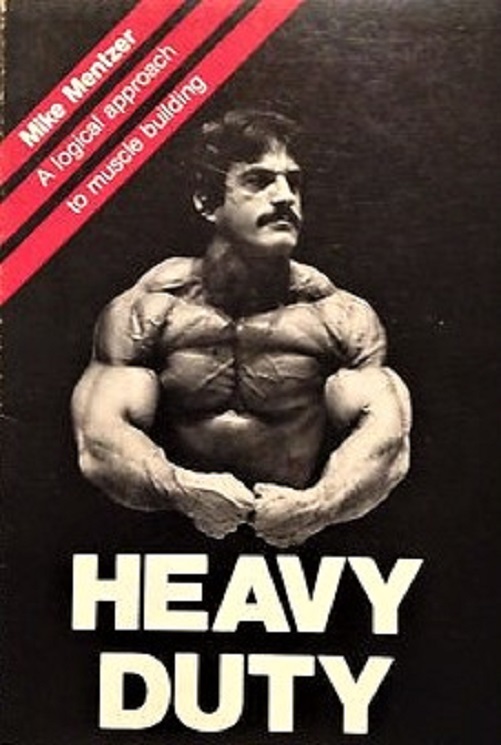
The rookie pro was poised to become the bodybuilder of the ’80s, and with many witnesses unconvinced that Zane had in fact beaten the Olympia debutant in 1979, Mike was installed as the favorite for the 1980 rendition to be staged in Sydney, Australia. Back in 1965, he had predicted that the Mr. Olympia title would be his in 1976, and with his Mr. America and Mr. Universe wins being achieved four years behind schedule, a coincidental credence was lent to 1980 being Mike’s Olympia-winning year. What, nobody could guess, least of all Mike, was that it would be his last year of competition.
HELTER-SKELTER
Digesting his 1979 loss, Mike planned to leave no stone unturned in his onslaught for the 1980 Olympia crown. “If they want more definition, I’ll give ’em more definition,” he vowed. Mentally, he went into a different gear and battened down the hatches earlier and more securely than for any other competition. He started dieting in February for the October contest. Previously, he had started dieting 12 weeks out. “I was consumed 24 hours a day by the thought: What can I do today in terms of training, diet, aerobics and motivation to improve myself? Everything I did was marshaled into the spirit of improvement.”
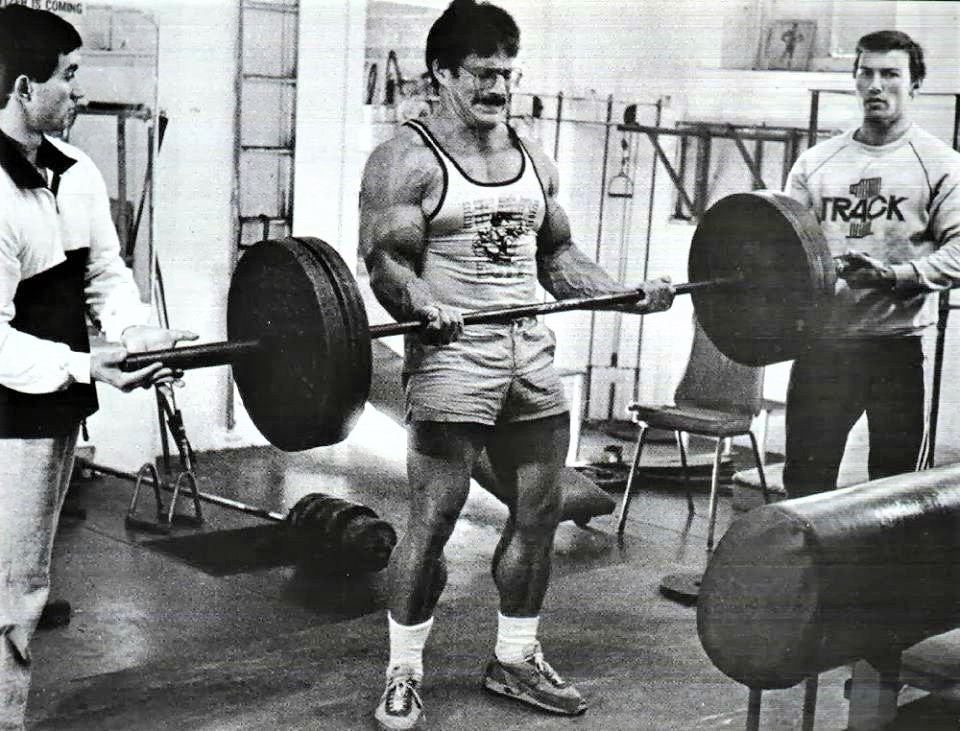
As 1980 unfolded, however, Mike had no inkling that his competitive career was hurtling toward its conclusion. In 1979, he had started taking amphetamines: “Not for the purpose of getting high—that was the furthest thing from my mind. I was taking them as ergogenic aids, to facilitate my hectic lifestyle. I loved being productive.”
A typical excerpt from Mike’s diary during that period reads as follows.
4 AM: woke up and read philosophy for two hours
7 AM: worked out
9 AM: wrote article
2 PM: rode bike for 14 miles
4 PM: napped
6 PM: ran for four miles
8 PM: practiced posing
9 PM: studied philosophy and dealt with mail-order administration
11 PM: retired to bed
“I was in love with being conscious—amphetamines have that effect on a lot of people. I’d read the literature on amphetamines and had never heard of any long-term physical damage, but I did know that it could possibly result in acute episodes of psychosis. I saw no problem for me because I was convinced I was focused enough and that my use was channeled in a positive direction.
“I didn’t think there was anything wrong in taking stimulants to make me work as hard as I was. A lot of people drink coffee and smoke cigarettes to stay stimulated and be productive. I was a productive genius, but I had lost sight of the fact that the body and the mind have limitations.” The warning signs were there. Twice, Mike awoke to find himself “at death’s door.” He was so fatigued that he couldn’t even raise his arms, and had to stay in bed for the remainder of the day. But the next morning, he was back to being a “productive genius.”
THE CONTROVERSY OF CONTROVERSIES
The 1980 Mr. Olympia contest staged in Sydney, Australia, remains by far the most controversial in the event’s history. The contention centers on the participation of Arnold Schwarzenegger, who had announced his retirement from competition in 1975 after winning six consecutive Mr. Olympia titles. Seemingly only in Sydney to do commentary for CBS TV, Arnold stunned the bodybuilding world on the eve of the contest by declaring that he was returning to competition in pursuit of a seventh title.
Two days before the contest, Mike had that same “death’s door feeling,” which again confined him to bed for a whole day. By the morning of the contest, though, he had recovered. He was 225 pounds and more cut than he’d ever been. “I looked my best, but I didn’t feel at my best. It just didn’t feel like a normal contest; no one was being their usual selves. There was a strain and tension in the air all the way through.”
WHO TERMINATED WHOM!
That strain and tension came to an electrifying climax at the competitors meeting held the morning of the contest. Fifteen of the 16 athletes had signed a petition asking that the two weight classes be abolished and that the Olympia should henceforth be contested as one open class. The one athlete not in agreement was Arnold Schwarzenegger.
Whatever the rights and wrongs, facts and misconceptions, theories and myths that surrounded the 1980 Mr. Olympia contest, in the interests of this narrative, it’s important to understand that Mike Mentzer felt he was cheated in Sydney, and that sinister machinations were afoot. His belief is that certain forces, fueled by ignorance and sycophancy, combined to thrust an undeserving Arnold to first place and relegate him—perceived as owning the best physique in the contest—to a “ridiculous” fifth place.
This is how Mike recalls that fateful day. “There were maybe 50 people at the competitors meeting and, as usual, Arnold wanted to be the center of attention. In every situation, he tries to be the standout, and on this occasion, he was the only athlete of the 16 in the contest who wanted to keep the two weight classes.
“He said something to denigrate Samir Bannout that I thought was uncalled for. I passed on that, feeling Samir should have defended himself. As the debate progressed, there was a lot of arguing between Arnold and some of the guys. I wasn’t really concerned one way or the other—I thought I could win anyway. Then Boyer Coe stood up and, as the gentleman he is, said, ‘Why don’t we let Arnold explain to us right here and now his exact reasons for wanting to have two weight classes?’
“Arnold barked, ‘Boyer, let’s talk like adults here.’ That really irked me, because Boyer made his plea with no hint of malice. In addition, this was the IFBB’s event, but here was this big Prussian son-of-a-bitch standing there and trying to walk all over us. I interjected and asked Arnold why he was so reluctant to see the open class introduced. For some reason, that question pissed him off. He seemed like a guy out of control as he turned to face me, his upper lip curled around like a snarling animal. We were debating the issue of weight classes, but Arnold chose to snap at me, ‘Mike Mentzer, we all know Zane beat you last year because you have a big stomach!’
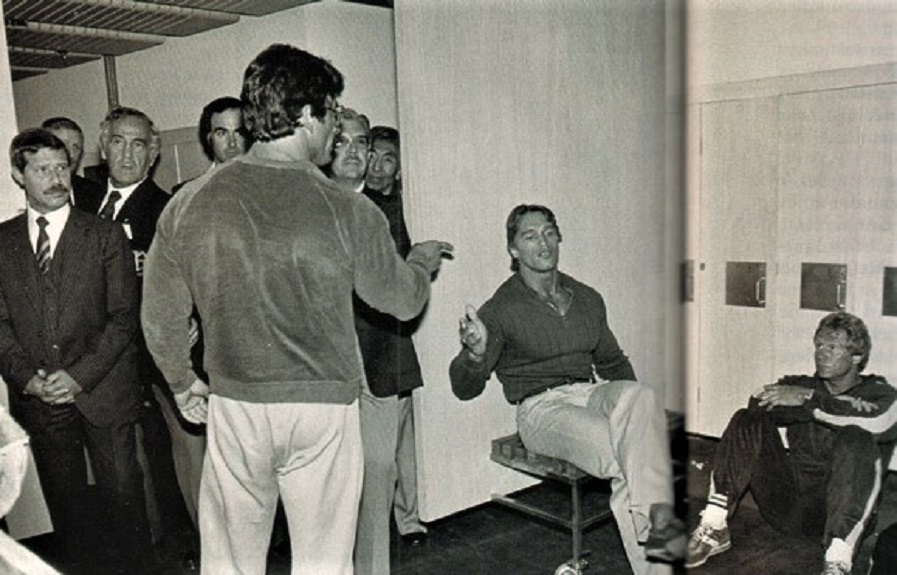
“I was seated 20 feet away from Arnold, who was standing holding court, and I perhaps allowed that comment to irritate me too much, as on impulse, I bolted toward him. As I approached him, I decided I wouldn’t hit him, but nevertheless I was surprised when Arnold sat down: I scared him! He sat as I continued to berate him. Wagging my finger at him, I told him, ‘Look, Arnold, Boyer Coe said what he did as a gentleman—he didn’t deserve that response. You’re the one who’s acting like a baby, literally! Arnold couldn’t look me in the eye. He went from being a frantic hysterical adolescent to shrinking away like an injured child.”
Not for the first time in the history of bodybuilding, Joe Weider stepped in and defused the situation. He advised Arnold to accept the voices of the other 15. The debate ended as Arnold proclaimed, “I withdraw my objection.”
DECISION DOWN UNDER
“Throughout that meeting, Arnold had on a tight-knit sweater that made him look skinny. I was curious to see what he looked like once he stripped down. When he did, I remember looking at him and thinking, Not only am I going to win this contest, but I’m going to beat Arnold Schwarzenegger as well! When I was called fifth, I was totally shocked. It was just a ridiculous placing, made more ridiculous by an out-of-shape Arnold winning. As for the others who finished ahead of me, I knew Frank Zane [third], due to an accident he had sustained four months earlier, wasn’t as good as he had been the previous year. I must say that Chris Dickerson [second] and Boyer Coe [fourth] were in phenomenal shape, particularly Chris. I felt he and I were the ones in absolute peak condition, and we should have been the top two.
“The majority of observers at the 1980 Mr. Olympia, with the exception of the judging panel, didn’t have Arnold in the top five. The crowd booed Arnold at the contest’s conclusion, and there were a number of things that took place during the prejudging that perhaps should have provided an indication that all was not as it should have been. Several of the judges were close friends of Arnold. Boyer Coe told me afterwards that he saw Reg Park, one of the judges, actually coaching Arnold from the officials’ table. In contrast, Bill Pearl had honorably removed himself from the judging panel, as he had spent time training with Chris Dickerson.
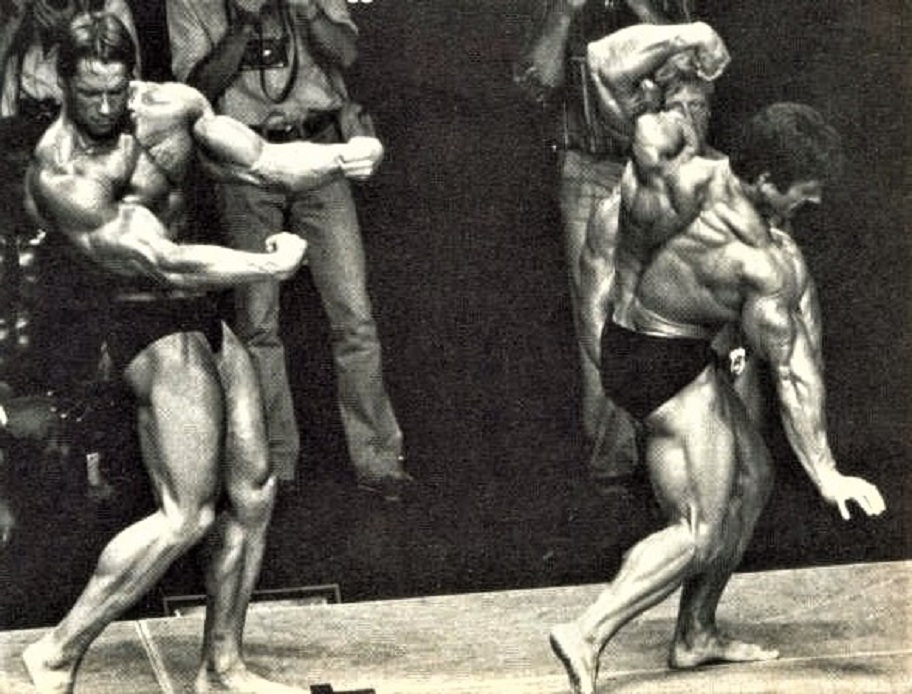
“At times, the contest was like a circus. We had Franco Columbu—one of Arnold’s weak-willed nambypamby lackeys—coming onstage with a towel, a comb and oil, to go through a little act with Arnold at the expense of everybody else. I could quote other anomalies, but possibly the most pertinent is that CBS Sports flew halfway around the world to tape the event and then never televised it. The word was that they were convinced it was a fix. The record may show Arnold Schwarzenegger as the 1980 Mr. Olympia champion, but he wasn’t the best bodybuilder onstage that day—not by a mile.”
In the immediate aftermath of the contest, several top names stated they would never compete again. They would later reverse their decisions and return to the contest dais. But even as he was announced fifth, Mike knew he would never compete again: “There was no way I was going to put myself through the same torturous process again for a similar reward. At no point since 1980 have I been even slightly tempted to consider the possibility of competing. I don’t miss it.” Of all of its repercussions, it is difficult not to nominate Mike’s premature retirement at 29 as being the major consequence of the 1980 Mr. Olympia contest. It effectively denied the sport a view of the physique he could have built in future years.
INTO THE LABYRINTH
In the wake of the 1980 Mr. Olympia contest, Mike Mentzer’s career began to fragment. In his seminars, he was openly contemptuous of the Sydney affair; a posture that he believes led to his being unofficially blacklisted by the IFBB, making promoters reluctant to book him. He left Weider publications, and by 1982, his income “had gone from $200,000 a year to zero.”
In 1983, Arthur Jones recruited Mike and brother Ray to work with him on research projects he was undertaking at his Nautilus headquarters in Deland, Florida. However, things didn’t progress the way Mike had hoped, and after six months, he and Jones severed their business relationship. Joe Weider rehired Mike in the fall of that year, but after six months, Mentzer left to assume the editorship of Workout, a newly launched magazine.
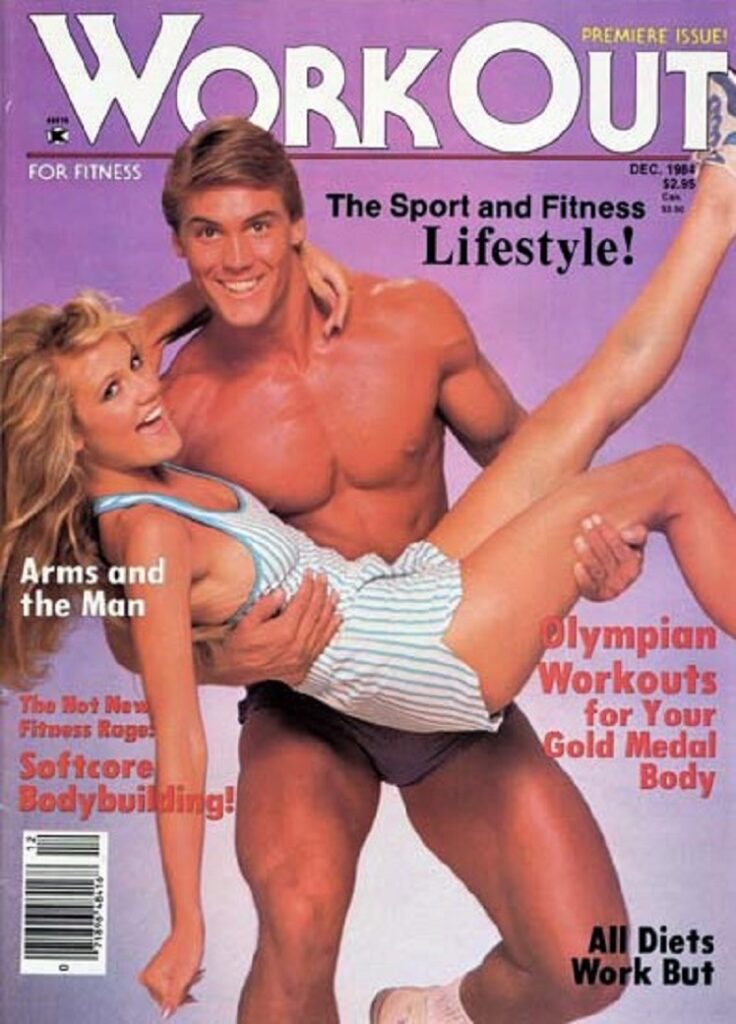
“Editing Workout was one of the most enjoyable things I’ve ever done,” Mike claims. “It lasted 18 months, and every day of that period I had the same commitment and ambition I’d had in preparing for the 1980 Mr. Olympia. I wanted the magazine to be the absolute best I could make it, and I worked harder than I’d worked in my entire life. Sometimes I’d stay awake for two or three days at a time to meet deadlines. I was using a lot of amphetamines to make me productive.
“The magazine was doing fairly well, when, just as it started to turn a profit, the financial people—for whatever reason—pulled the plug on the whole thing and we ceased operation. It was a crushing blow. I’d put 110% into the enterprise and it hadn’t worked out.”
The folding of Workout in 1985 was just the first prong of a triple emotional whammy that was delivered to Mike. That same year his father—whom he idolized—died. Mentzer was also dealing with the fallout caused by the ending of his relationship with Cathy Gelfo. “I was left floundering without anything to invest my energy in,” he recalls. “I allowed myself to become consumed by grief. I wasn’t focusing on anything. I had no sense of direction.
“I was still using amphetamines, and that use, in association with the series of traumas, did something to my mind that I’m fairly clear about today, although these things are very complex. The combination of being emotionally distraught, which can cause an individual to lose conceptual control, exacerbated by my use of amphetamines did something to my emotional core that led me to perform irrational acts that I thought were rational. There were forces at work in my unconscious that I didn’t have an explicit knowledge of. As Ayn Rand [philosopher and novelist, of whom Mike is a disciple] pointed out, ‘That which is not explicit is not in man’s control.’ I didn’t have an explicit understanding of what was going on. Therefore, I wasn’t in full conceptual control. I wasn’t in control of my mind, although I thought I was.”
It was to be five years before Mike regained control of his mind.
THE BEWILDERNESS YEARS
Stories began to proliferate in the bodybuilding world of a crazed Mike Mentzer indulging in increasingly bizarre behavior: running naked through the streets; directing traffic; prophesying the end of the world; being arrested by the police numerous times; waiting for aliens to land. Some of these stories are true, some are not. When Mike is confronted with these “incidents” and asked whether their publication would embarrass him, he laughs, “I’ve been through so much that if you tried to embarrass me, you couldn’t do it!”
During the five years that Mike wrestled with his demons, the bodybuilding community, to its discredit, took a detached stance toward his circumstances. There were two notable, and noble, exceptions: ex-girlfriend Julie McNew and John Little, now a senior writer for FLEX. “Julie, even though our relationship had ended, was very supportive, emotionally and financially, over that whole five-year period,” Mike states. “Only now can I appreciate her friendship. John Little was one of the few who didn’t approach me on the ignorant assumption that I was a ‘loony’ or a ‘crazy.’ John understands quite a bit about the power of ideas and the way they work in the mind. He would talk with me at length, and I remember those conversations with fondness, which causes me to think fondly of John Little. He never wrote me off.
“It did disappoint me that, apart from Julie and John, no one from the bodybuilding world made an attempt to extend support—I mean spiritual support, not financial support. But I understand that for some people what was happening to me was probably beyond their powers of comprehension, and they had their own life dramas going on. Perhaps they did the best they could.”
For five years, Mike was on a road to nowhere and/or oblivion. At times, he was suicidal and was regularly institutionalized. All forms of medication and therapy had proved impotent to his condition, but as the ’90s dawned, Mike had been amphetamine-free for 18 months.
RELEASE
The story now moves full circle toward that “eureka” moment in January 1990.
“During that last confinement, I slowly began to see daylight. The perception gradually seeped through that the acts I executed, and the thoughts I had, couldn’t be rational because I kept on coming up empty. I had thought all my actions of the previous few years had been logical, when in fact they’d been 180 degrees removed from being logical. I began to acknowledge that the emotional trauma caused by my father’s death, the closure of Workout and the end of my relationship with Cathy, combined with my amphetamine use, had really done something to my mind.
“I’d exhausted all avenues of thought on my predicament, and realized I was wrong. It was me that was out of control, not everybody and everything else. I knew I had to wake up to that fact or my life would be over. As soon as that realization hit, I was appalled at how much time I had wasted. It was time to move on. It was time to ‘Go back to what you know, Mike Mentzer!’”
Mike Mentzer went back to what he knew with a vengeance. Almost miraculously, within a few days, he was establishing his personal-training business at Gold’s Gym, Venice. His progress over the last four years has been onward and upward. Currently, his clientele list is as much as he can handle, his mail-order business is thriving as never before, he writes a monthly feature and column for FLEX, his phone-consultation service is ringing off the hook, and in 1993 he published a ’90s update of his Heavy Duty principles, which is selling like proverbial hot cakes. Also that year he opened his first Medex clinic [which specializes in rehabilitation from injury through exercise] in Santa Monica.
Always revered as the thinking-man’s bodybuilder, Mike is also deeply embroiled in the study of philosophy and objectivism, and he harbors the prospect of those studies eventually leading him in yet another professional direction.
EPILOGUE
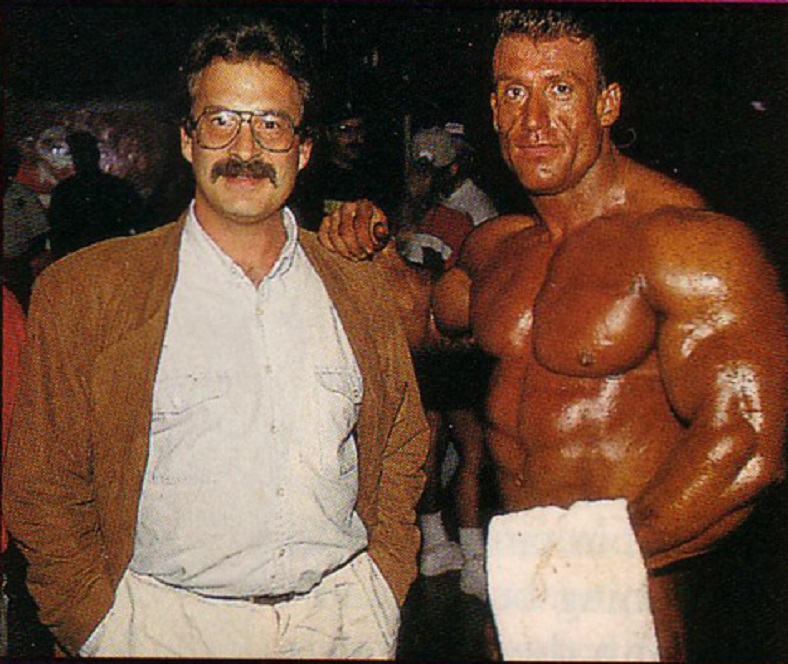
In February 1990, as Mike Mentzer returned to the bodybuilding scene, 6,000 miles away in England a young man was preparing to make his professional bodybuilding debut—a byproduct of which would give Mike’s relaunched Heavy Duty principles the highest possible validation. The young man was Dorian Yates. Openly espousing Mike’s training methods, the Brit moved inexorably to stewardship of the Mr. Olympia title. Today, Mike and Dorian are in partnership, preparing to market their Heavy Duty clothing line.
The connection with Yates and the Mr. Olympia crown prompts the question as to whether Mike, perhaps in an unguarded moment, ever feels unfulfilled by never securing the title he had prophesied for himself nearly 30 years ago in that now-lost copy of Muscle Builder/Power. “It’s not relevant anymore,” he states. “It’s all behind me now. There was a time when I never thought I could say such a thing. I was obsessed by being a bodybuilder, obsessed by the thought of being Mr. Olympia. And even though, during those times, I never completely neglected my mind, if I could go back, I’d reverse the priority: The development of my body would be secondary to developing my intellect.”
What about his current thoughts on the 1980 Mr. Olympia brouhaha, which will always be associated with him? “I don’t think about the contest too much. I’m bored with it. I mean, 14 years after the event, how much more can I say?” He pauses, then smiles. “Enough time has elapsed to allow me to look back and giggle at the exertions I went through in my obsession of wanting to be compared with others. I now see myself, as I think we all should, as an individual.”
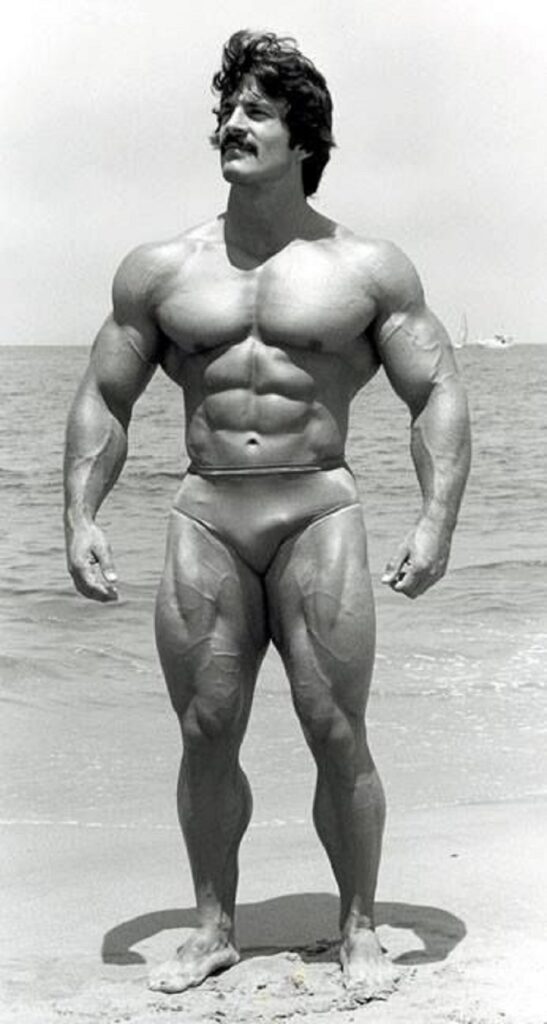
That Mike Mentzer—perhaps the owner of the best physique never to win the Olympia title; the one who exerted a massive influence on the present incumbent of that throne; the gifted student who became the sport’s most eminent teacher; the superstar who vanished into a black hole of beckoning destruction before emerging once more into the light; a man of integrity who never chose to trade on pity or past accomplishments—is an individual cannot, surely, be argued.
Related content:


